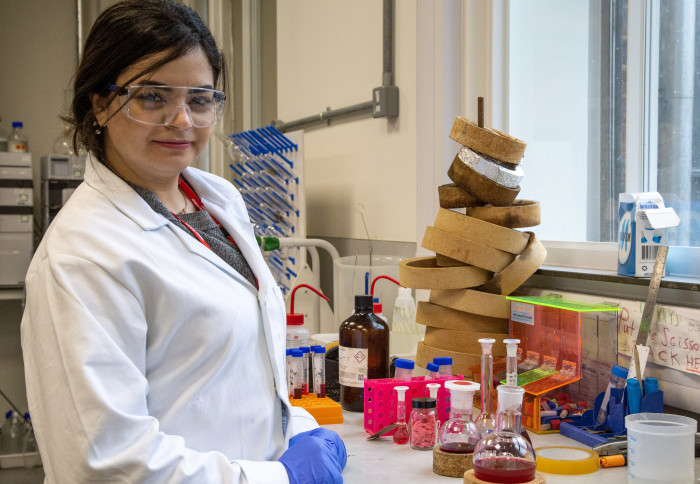Imperial alumni selected for Fashion for Good’s Global Innovation Programme
by Gemma Ralton

Dr Aida Rafat, co-founder of DyeRecycle
DyeRecycle, set up by two Imperial alumni, is among eight start-ups selected as part of a new programme run by Fashion for Good.
DyeRecycle, founded by former Imperial Chemical Engineering PhD students Aida Rafat and Anton Firth is among eight start-ups selected to be part of a nine-month Global Innovation Programme run by Fashion for Good.
DyeRecycle's innovative thinking proposes a new way to colour clothing sustainably, using a circular chemical technology to decolour textile waste and reuse old dyes.
The team pitched their innovations to Fashion for Good whose mission is to bring together the entire fashion ecosystem through their Innovation Platform and as an advocate for change.
The 2022 Global Innovation Programme
“We are very excited to participate in the nine-month Fashion For Good (FFG) innovation program to accelerate our commercial and technical development.” Aida Rafat and Anton Firth Founder of DyeRecycle
The selected innovators for the programme represent technologies across raw materials, processing and end-of-use innovations; three pivotal areas for significant impact and carbon reduction opportunities. The 2022 Innovation Programme provides bespoke support based on the development stage and ambitions of each innovator, matching innovators with relevant industry partners to drive piloting, implementation, and investing activities.
Commenting on their successful pitch Rafat and Firth said: “We are very excited to participate in the nine-month Fashion For Good (FFG) innovation program to accelerate our commercial and technical development.”
“Having this access to the FFG ecosystem and partners will allow us to better understand customer needs and where to best fit our technology in the supply chain. The value of the program also extends beyond nine months, as we will continue to have access to FFG partners and support as a program alumni.”
Cleaning up the fashion industry
The fashion industry is a major polluter in need of an urgent makeover. Responsible for up to ten per cent of global emissions, it has been a disaster for people and the planet.
With a destructive and irreversible effect on the environment, it depletes the world of non-renewable resources, releases greenhouse gases into the atmosphere and drains vast amounts of water and energy.
It is estimated that the fashion industry is responsible for two to eight per cent of global CO2 emissions – greater than all international flights, maritime and shipping combined.
Colouring clothes sustainably
DyeRecycle develops innovative circular solutions for dyeing using textile waste. Their proprietary technology combines the need to recycle both dye and fabrics.
The circular process uses a unique liquid that selectively extract dyes from coloured waste fabrics. This decoloured fabric can be recycled more effectively, and the extracted dye is transferred to new fabrics, creating a new concept of “recycled dyes”.
Their technology also has the capability to transform textile waste scraps into dyestuff powder – a fine-powdered pigment used in manufacturing and the visual arts.
DyeRecycle’s mission is to dramatically reduce fashion industry’s chemical and water footprint in a cost-effective way by giving old fibres and dyes a second chance. The process provides at least 85 per cent reduction in dyestuff and chemicals use compared to conventional dyeing process along with 65 per cent reduction water footprint and 70 per cent less global warming potential.
Reflecting on the Global Innovation Programme Rafat and Firth added: “Being mentored by industry experts will ensure that our technology development is in alignment with the value chain requirements, and therefore facilitate our integration to the supply chain. It is a great opportunity for us to build long-term partnerships with brands and manufacturers to work with in the future.”
Article text (excluding photos or graphics) © Imperial College London.
Photos and graphics subject to third party copyright used with permission or © Imperial College London.
Reporter
Gemma Ralton
Faculty of Engineering